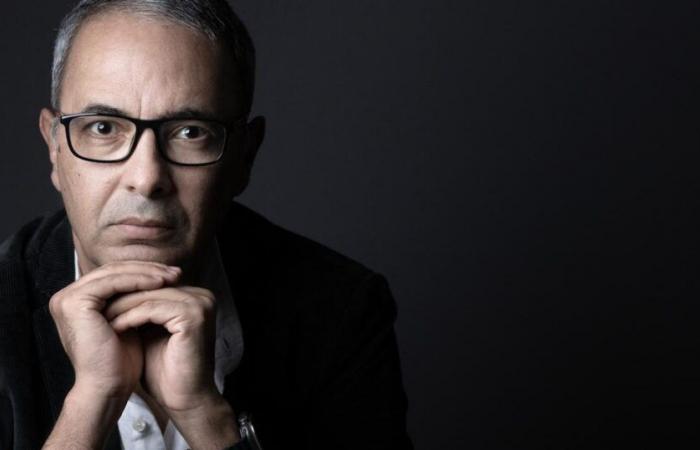On Monday, the Goncourt jurors gathered at the Drouant restaurant in Paris to announce the name of their winner. Kamel Daoud won the most prestigious literary award in the first round with six votes.
Kamel Daoud or Gaël Faye? Just a few days ago, it seemed accepted, based on persistent rumors, that the Goncourt final was going to be played between the two authors, critical and public successes. No one anymore mentioned the names of Sandrine Collette and Hélène Gaudy, although they were still in the running. One or the other was bound to win the prize. A question remained: which of the two?
At 12:45 p.m., Claudel du Goncourt appeared at the top of the stairs leading from the ground floor to the Goncourt salon located on the first floor to speak. « The 122e Goncourt Prize was awarded in the first round, to Kamel Daoud for Houris at Gallimard. »
By choosing to crown Kamel Daoud, the jury firstly performed an act of political courage. Let's remember the facts: Algeria has decided to ban the Algiers International Book Fair from Gallimard Editions because of the author's novel. In Houris Aube, a survivor of the black decade (1991-2002) in Algeria, pregnant and mutilated, tells the little girl she is expecting, the tragic story of these bloody years. Ardent defender of freedom of expression, Atiq Rahimi then wrote an open letter, providing his utmost support to the author. However, by awarding him the Goncourt, the jury affirmed in the same way, and without fail, the total freedom of the writer. A writer who is used to disturbing.
Columnist and journalist, Kamel Daoud was born in 1970 in Mostaganem, Algeria. A “Balzacian” character, in his words, he is 20 years old in the 1990s, a villager who finishes his studies and arrives in town. Very early on, he decided to launch into journalism, joining the Quotidien d'Oran and investigating the massacres committed in his country. Despite insomnia, the unspeakable which imprints itself on the retina, Daoud writes, edits, testifies. « Journalism is essential but it will never be enough to tell the story of a war. I often say that an injury is measured by journalism, and that it is told through literature. »he confided to Madame Figaro. At the dawn of the 2000s, he began to publish and gain attention as an author. Let's note: Minotaur 504 (2011), selected for the Goncourt short story prize and in particular his novel Meursault, counter-investigation (Gallimard, 2014). This publication caused him to be targeted by a fatwa when he was a finalist for the Goncourt – he narrowly missed the prize and finally won the Goncourt for the first novel.
Just yesterday, Kamel Daoud shared on X (former Twitter) the photo of an Iranian student, Ahou Daryaei, undressed in front of her university in Tehran. With Houris(which means “very beautiful woman promised by the Koran to faithful Muslims who will access paradise”), Daoud knew that he would be embarrassing by denouncing the amnesia of the barbaric acts committed by the Islamists. His words are incisive and implacable. He also chose to highlight in his book article 46 of the law established by the Algerian authorities called « Charter for Peace and National Reconciliation of 2005 »punishing « with imprisonment of three to five years and a fine of 250,000 Algerian dinars to 500,000 Algerian dinars anyone who, through his statements, writings or any other act, uses or instrumentalizes the wounds of the national tragedy, to harm the institutions of the democratic and popular Algerian Republic, weaken the State, harm the honor of its agents who have served it with dignity, or tarnish the image of Algeria internationally (…) » However, if Houris is a cry of denunciation, the author defended himself L’Obs, « to write a war, but how we get out of it. That's why I called my character Dawn; it is the difficult hour, between two worlds, where sun and night coexist, but where things start again. »
The choice was therefore far from easy in the face of Gaël Faye, eminently likeable and popular (he has already sold more than 173,000 copies of Jacaranda). In addition, it was necessary to decide between two books relating to massacres (Houris as we have said, evokes the civil war of the 1990s in Algeria, Jacarandaafter the Rwandan genocide) or at least its survivors. With Daoud, the jurors were undoubtedly touched by this incantatory language, these words of fire and blood, “a long polyphonic song”as noted The literary Figaro in its September 5 issue. « The rhythm is varied, the words abundant, disordered, made up of snippets, like a conversation, with confidences, digressions and outbursts of voice. […] Daoud's book has the force of a wadi in flood after a terrible storm called civil war. Impetuous, unpredictable, fascinating, he sweeps away everything in his path. »
Finally, and this is no small thing, by crowning Daoud, Goncourt crowned Gallimard. And we can say it, the house was hot. First, because unlike previous years when she had been able to console herself with the Grand Prix of the French Academy (Giuliano da Empoli in 2022 and Dominique Barbéris in 2023), she had until then obtained no prize from the literary return. Then, because for two consecutive years, she was beaten in the final: in 2022, Giuliano da Empoli lost to Brigitte Giraud (Live fast, Flammarion), and in 2023, it was Éric Reinhardt's turn to admit defeat against Jean-Baptiste Andrea (Watch over herThe Iconoclast).
That being said, Gallimard still had a very good chance of winning the prize. While she already had four authors from Goncourt, published in her house, last April she welcomed a new juror with Françoise Chandernagor. As a reminder, the jury has ten members. Furthermore, unlike Grasset who has not won the Goncourt since 2005, Gallimard won it barely four years ago. And what's more with Hervé Le Tellier, who became the second best-selling Goncourt in history.






